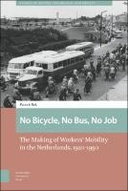Explore

For working people, the cost of getting to work, in terms of time and expense, is a crucial aspect of daily life. In the twentieth century, people’s opportunity to travel increased. This did not, however, apply to everyone. The absence of affordable housing near job locations combined with the lack of safe, efficient, and affordable mobility options aggravated social exclusion for some. No Bicycle, No Bus, No Job details how power relations have historically enabled or restricted workers’ mobility in twentieth century Netherlands. Blue-collar workers, industrial employers, and the state shaped workers’ everyday commute in a changing playing field of uneven power relations that shifted from paternalism to neo-liberalism.
This book is included in DOAB.
Why read this book? Have your say.
You must be logged in to comment.
Rights Information
Are you the author or publisher of this work? If so, you can claim it as yours by registering as an Unglue.it rights holder.Downloads
This work has been downloaded 9 times via unglue.it ebook links.
- 9 - pdf (CC BY-NC-ND) at OAPEN Library.
Keywords
- Central government
- Central government policies
- History of engineering & technology
- Politics & government
- Society & Social Sciences
- Technology, engineering, agriculture
- Technology: general issues
- thema EDItEUR::J Society and Social Sciences::JP Politics and government::JPQ Central / national / federal government::JPQB Central / national / federal government policies
Links
DOI: 10.5117/9789463723183Editions

